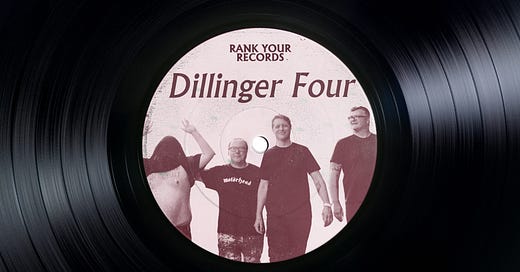Rank Your Records: Dillinger Four's Erik Funk
As the band celebrates 25 years together, the guitarist and singer looks back at their four albums.
Hello and welcome to REPLY ALT, the world’s greatest email newsletter about music. REPLY ALT is free to subscribe, although you can opt for a paid subscription for a measly $5 a month. That’s only like 1.5 PBRs at Fest and it greatly helps me pay my rent and keep doing longform journalisms.
Dillinger Four is celebrating 25 years as a band this year. For many punk bands, such an anniversary would involve a shameful trip down memory lane, reconciling with the embarrassing early days that often came with mid-90s punk rock juvenalia. But Dillinger Four came out fully formed. By the time their debut album, Midwestern Songs of the Americas, was released in 1998, the band had nailed down an identity that was distinctly their own, blending catchy pop punk songwriting with an abrasive hardcore bent. As a result, their catalog stands the test of time a lot better than that of many of their peers.
“It feels like we’re aging well, in the sense that we were never caught up in any trends,” says D4 guitarist/singer Erik Funk. “We were never a ska-punk band. It’s not like, ‘Hey remember when we were emo and now we do Emo Nite at a bar?’ We weren’t the type of band that had a time, so now’s just as good a time as then.”
And while Dillinger Four has had long stretches of inactivity over those 25 years, that was always their intention. The band was what they did between having jobs and families and businesses. “I don’t think we thought of it as a full-time band, even when we put out three records in the span of six years and toured between all of them,” says Funk. “We were just doing our band the way other people did punk bands at the time, which is the thing you do besides whatever you actually have to do.”
D4 is playing three shows this winter to commemorate the anniversary in Chicago, Des Moines, and their homebase of Minneapolis. Funk recently put Dillinger Four’s four influential studio albums in order of personal preference. And while the band hasn’t released a new album since 2008’s CIVIL WAR, there’s a fifth album in the works, he says, and he really, really means it this time.
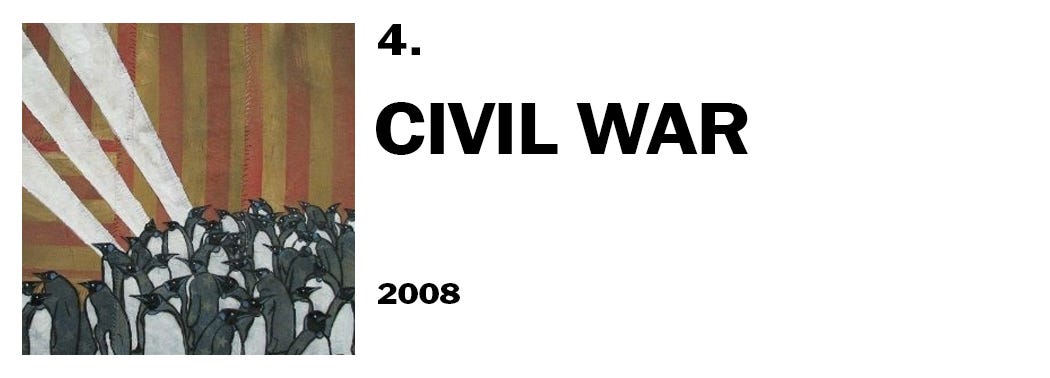
This was the longest stretch you had between albums—six years. What was going on that knocked you off of that prolific track you’d been on?
Erik Funk: For me, that was the time when Triple Rock was really being built on and we started doing shows. For our drummer, that’s when he had finished school and had a professional life that was taking off. Maybe it was just the age we were hitting, but a more settled life was encroaching. At the time, it seemed like, “Wow, I can’t believe it’s been five or six years.” That seemed unheard of, that we’d have gone that long. And of course now, we’ve absolutely demolished that record. [Laughs]
Congrats on that, by the way. But do you think in that extra time, you lost any of the band’s identity? Did you change at all in that wilderness period?
The only thing that was really different about that period was there was no recorded output. But we were still playing just as frequently in town. We probably weren’t doing as much touring. It might not have been four weeks in a van, but we were definitely still doing a week or two. And the other thing is that it was six years between the releases, but it’s not like we wrote those songs for six years and then recorded them. The songs all got recorded in year five.
I don’t think it’s crazy for me to say that D4 never tried anything drastically different, musically, on any of your albums. But this one does seem to be the sonic outlier in your catalog. There are moments that are maybe more tender than anything you’d done.
Tender, hm. You can just say wimpy.
I mean on a song like “Gainesville,” that sounds more melodic than your previous work.
There are a couple things with that song. The thing that was happening when we were writing that record was that my father-in-law was dying, and died shortly before we recorded—terminal cancer. So, the way I write is putting together something catchy, and then, normally, the way D4 thinks is: Well, if you have something that’s too catchy, you have to mix in a really atonal part. You have to sabotage that song somehow. That’s sort of how we’ve done everything. A lot of these songs had already felt a little more personal than previous songs, and a little bit from a more darker place from what I was going through, so I said, you know what? I’m just gonna go completely the other way and let this be as poppy as it wants to be, and make it the sunniest, happiest, funnest D4 song.
How do you feel about that song becoming this inadvertent Fest anthem?
You know what’s funny is that after it was done, and the lyrics were written and recorded, Paddy [Costello, bassist] was like, “Oh my god, dude, Fest.” It didn’t occur to me at all that Fest is in October and all that. The way we write is that we do music, we record everything, and then, by and large, most of the lyrics get written while we’re recording. Most of the time, the first time we’ve sung a lyric, it was right into the mic onto tape. For instance, Paddy, he doesn’t know any of the lyrics to my songs, and I don’t know the lyrics to his songs. I don’t know what his songs are about until they’re done and going on the record. And then afterwards, Paddy titles them. He has a knack for that. So I don’t know what the songs are gonna end up being called.
I wanted to ask you about that breakdown between you two. I don’t mean this in a derogatory way towards you personally, but I feel like Paddy is such a focal point of the band and you yourself often come off as a secondary player, even though you do the heavy lifting on a lot of your albums, and especially this one. Is that dynamic misinterpreted?
Yes and no. Paddy comes off as a lot more devil-may-care than he really is. He’s definitely got a persona, and that goes all the way back to before he could even play bass. He’s always been that guy. He’s Paddy, the hilarious wild card. But actually, Paddy thinks about everything he does. Even in the moments where it doesn’t seem like he’s thinking about anything, he is. Not to say that he hasn’t gone way past that point where he’s off the rails, but a lot of times when he’s off the rails, he knows what he’s doing. But at the same time, if something needs to get done, I’m gonna make sure it gets done—with records and schedules, that’s gonna be me going, “Well, we’re four songs short, so I’m gonna write four more songs.” Whereas Paddy does that stuff when it’s natural for him, I can do it like I’m cramming for a test.
You keep your pants on during the set.
Yeah. And we have a little of an Abbott and Costello-sort of thing. But I think, in a lot of bands, that dynamic is there. Especially in a scene where you do everything yourself, there’s always someone in the band that’s that person doing the more mundane stuff, and then there’s the more outgoing, exciting personality.
It’s so quaint to talk about ten years later, but someone in the press got fired for leaking this album.
Isn’t that funny to think about now? That sounded insensitive. I don’t mean it was funny.
Right, I just mean it’s odd in hindsight because I don’t even know if there is such a thing as leaking anymore.
Yeah, the timing of that record—because six years was so long—it made it seem like a really anticipated record in our little corner of the music world. That made it seem more dramatic, I think. The timing of it, just right on that edge before the way music is distributed just is the internet. But back then, it was like, wait a minute, aren’t companies supposed to make records and CDs and sell them? That was the last gasp of that old model, before it just fell, for better or worse.
Do you think the extra time this record took affected people’s perception of it, either among your fans or in the press? Did it have too much to live up to?
The other byproduct of the where the internet had gotten to was the direct feedback we’re all accustomed to now through social media. But at the time, that was still pretty new. Six years before that, your record came out and the opinions you got were from the press. It wasn’t anybody who’d heard it commenting directly on it. People were generally more positive than I thought they might be. There was a lot of… what’s the phrase? “I think it’s a grower, not a shower.” [Laughs] Which I thought was pretty fair. I thought the criticisms were fair. It was slicker in not the right ways, necessarily. Some people didn’t like that. I think there have always been people who thought our earlier records either sounded like garbage and not polished enough or people who loved us because of that. I’ve heard both many times.
Just about every time I’ve seen you interviewed since this album came out, including the time I interviewed you, you’ve said that you definitely have some new songs written. At this point, even if you do have songs written, it’s been ten years. Are you worried that they’ll get dated or stale by the time you actually record them?
Two things. One, whenever I say that, it’s true. I’ll say it right now: I do [have songs] but they’re not the same ones I had seven years ago or five years ago or three years ago. Those songs just go away.
So you just constantly have a fresh batch of songs that nothing ever happens with.
Yeah. And then every once in a while, when we’re buckling down, that stuff’s in the back of my mind and I may dust it off. And usually when I say a song is written, it’s awaiting completion. It means I have to sit down for 20 minutes or an hour and finish it. But that 20 minutes may never come. But we really are committed, internally as a band, that we really, really wanna get something out in this coming year.
Would you do it with Fat Wreck Chords?
I mean, I can’t think of another label that would’ve supported a band that’s done as little as we’ve done. [Laughs]
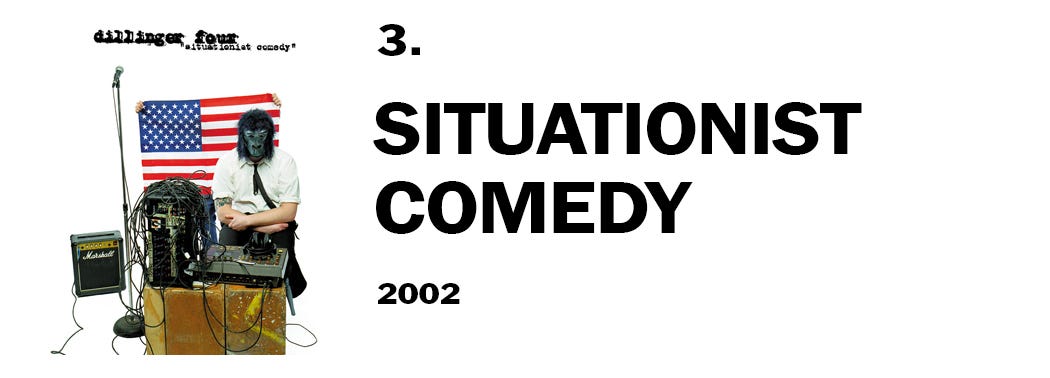
This was at that tail-end of when you were putting out a record every two years. That’s a pretty steady pace. Was that too much on the band?
It didn’t seem like too much. That was just a super exciting time for Dillinger Four, ‘97 to 2003 or 2004. We were kind of acting like a band—putting out records and playing shows and touring. Things were sort of growing in interesting ways. It was like a heyday, I guess. With Situationist, it was our first record for Fat. We had a lot of different labels to choose from at the time. That was very exciting. We were kind of spoiled for choice and we chose Fat. I think we made a good record, and a very quintessentially D4 record. Paddy contributed a lot on that one. I felt like it was a really representative record of where we were at that time.
2002 was a pretty fertile time in punk and, as you said, that was sort of the band’s heyday. But you guys were just so uninterested in playing the game.
Yeah. We were always excited in trying to build, but only in ways we thought were interesting. We weren’t gonna waste time on something just because in theory it’d be better for the band. That’s not to say we never made mistakes.
Is there anything you wish you’d done but didn’t?
No. But I mean, probably getting our act together as far as the internet would’ve helped.
Are you telling me the Angelfire website was not a good move?
Yeah, I do wish we’d just been more interested in that stuff. I wish we’d put those ducks in a row at the time. It’s a lot harder to play catch-up. Now those tools are so valuable for bands and we’re way behind on that stuff.
But let me ask you this: Do you think your reluctance to do these things that other bands were doing ultimately helped you? It seems like it added a bit of mystique to your band that people find appealing.
I think so. When I look at all the bands that followed the track you’re supposed to get on, doing opening slots for every big band and doing Warped Tour, I’m not sure they’re necessarily remembered any better for it. I’m not sure all that exposure matters. A lot of the bands did that whole track, they’re broken up and they’re done and no one really thinks about ‘em anymore. If we would have done all that stuff, maybe we wouldn’t be doing our 25th anniversary this year.
What do you think is the biggest misconception about your band?
I think that people write off a lot of the things that are known about us—“Oh they’re crazy, they don’t care about how they sound live.” I think people assume that’s a laziness thing. We’re not lazy people.
But to play devil’s advocate, you perpetuate that a little bit. You still have an Angelfire website, your Wikipedia page is four sentences long. Do you think the slacker image helps you a bit?
I can see where it does, but people think that’s lazy because we should be doing all those things. I mean, yeah, I just accepted that we should’ve got it together with the internet a little earlier, but really it’s just that we don’t prioritize those things because we prioritize other things in our lives. It’s not that we’re watching TV and drinking at the bar at night. We’re not those people. We’re busy people. That being said, we’re really self-deprecating, that’s our humor, and we do play into it sometimes, I’ll admit. But this idea that D4 don’t care about their band.—oh, no, no, no. We definitely do.
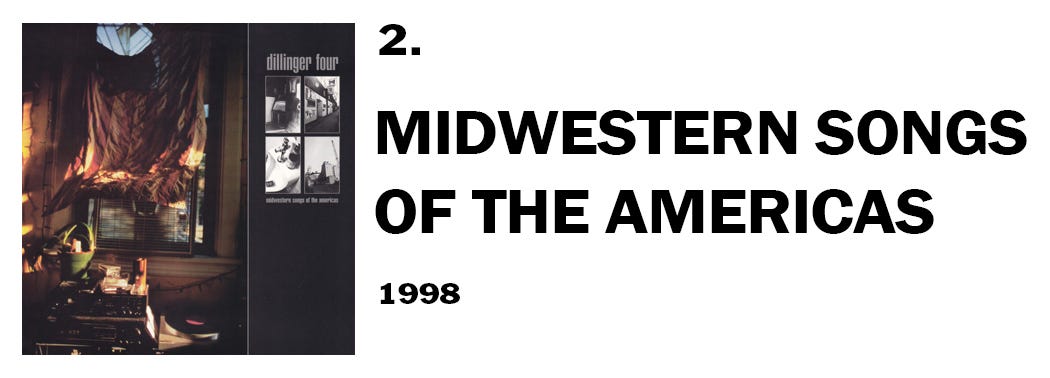
You’d been around for four years before you put out your first record. Most bands are eager to record right away. What were those early years like?
The first couple years, we were figuring out what kind of band we were. I don’t know if people know, but Paddy kind of learned to play bass to play for D4, and he wasn’t, like, 14. I’d never sung in a band. Neither of us had been in a band that played anything but hardcore. We were also right smack in the middle of when Minneapolis’ punk scene just got amazing, with Extreme Noise Records opening and the way the scene was coming together across genres. It was kind of unheard of at the time. We toured kind of a lot then. We made a lot of our gas money by distributing Minneapolis hardcore records—Havoc Records and Profane Existence stuff. It just took a while before anyone who could do a full-length record asked us.
Being from the Midwest is such a distinct part of your personality. I mean, it’s right there in the album title. How has being from Minnesota shaped your identity?
Especially back then, pre-internet, the coasts really dominated. The West Coast had catchier punk and the East Coast had hardcore. It’s not something we were conscious of but all Midwesterners have a… It wasn’t hard to get people to rally behind that sentiment in the Midwest—we’re our own thing! That was a popular notion that we voiced more.
Feel free to disagree, but it seems like after this record came out, a lot of bands started to borrow from the D4 sound.
At the time, I don’t think we were noticing as much. Now we can look back and see that, and there’s plenty of bands who cop to it. It seems so easy on its face, but pop punk bands at the time generally didn’t have much to say except typical pop punk sentiment, Propaghandi being a big exception and a big influence on us at the time, and J Church to some extent. It was kind of easy to set yourself apart with that. And Paddy and I had a background in hardcore. So we became the catchy band that it was OK to like if you were a hardcore kid. [Laughs]
When did you form that identity?
That notion was in a conversation at a pizza restaurant before we even had a couple songs or a name. We decided we wanted to be something like that right from the get-go. We wanted to do a catchier band, but we didn’t want it to be like a bubblegum band.
What were your influences were you drawing from then?
The first song I think we played together was a J Church cover, “Bomb.” A lot of East Bay stuff. Paddy and I were from Chicago, so Screeching Weasel. The first Propagandhi record. Not really the Fat stuff yet. At that time we weren’t quite as into the Epitaph/Fat stuff. And also hardcore and the UK punk stuff.
I keep thinking about what you said earlier—that in songwriting, D4 has to self-sabotage. Does that also apply to the recordings?
Yes. Absolutely. All four records are recorded by the same couple of people, the main one being David Gardener. He kind of learned how to record on the same timeline that we learned how to be a band. He was also still figuring it out. We’d do stuff like set up weird mics in hallways and scream and do all kinds of experimental stuff, just to see what would happen.
When you listen to Midwestern Songs back, is there anything you wish you’d done differently? Or it just came out the way it came out?
It came out the way it came out. There’s stuff that I can hear that later on I’d know how to do right. They’re small things, by and large, but there’s a lot of stuff I’m glad we did because we probably wouldn’t have tried it later.
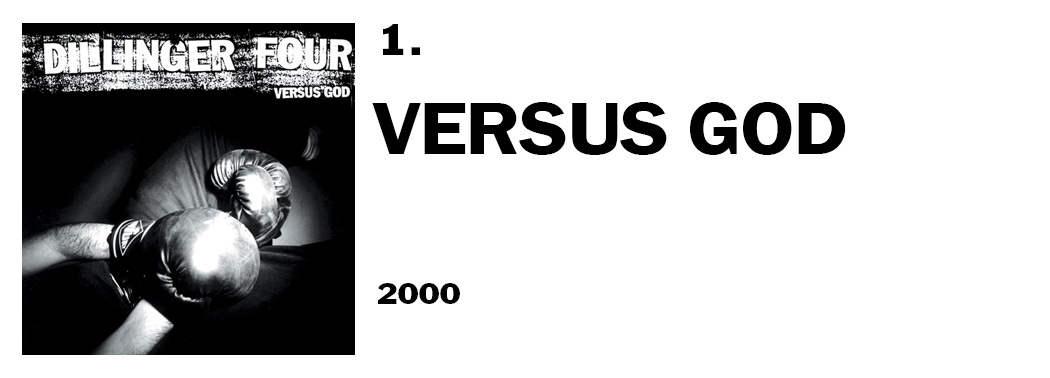
What puts this one at the top in your mind?
It’s hard. I’ll be honest, really, there aren’t huge drop-offs from one album to the next. For me, I think I rank records by… Most records have high points. For our albums, I think the high points are about even. It’s more about the filler. [Laughs]
You feel like this one has the least filler on it?
Yeah. When I listen back to it, it’s got the least cringe moments for me. The other thing I think is that this was still a time when the sequencing mattered, and how the record flowed mattered. And I think on Versus God, we got that. What we wanted to do with samples and all that kind of stuff, that worked really well for me on that record.
Especially in the beginning of the record. It feels like the way the cover looks, just getting hit by a few punches in a row.
Yeah, all that stuff came out exactly as I’d hoped. The writing was a little different. Paddy had been living in Gainesville for a lot of that time. So we were more separate than we’d ever been, which is why Paddy doesn’t have as much stuff on it. That’s the knock on that record, for me. A good D4 record is about 50/50. They’re all 13 songs, so it’s six, me and seven, Paddy, whatever. Something even is what I like.
You mentioned the samples. I’m curious who chooses those and where they come from.
In the early days, on the seven-inches, Paddy used to carry around a Dictaphone, a little tape recorder, when we were touring. He would just grab stuff from wherever. And then as we made more records, we had to worry more about whether stuff was protected.
You ever run into any legal troubles?
Nope. Never had an issue. That’s one of the many benefits of not having rampant success.
I read an interview with Paddy where he said you considered calling this record Who Farted?.
[Laughs]
Do you ever wish you’d called it Who Farted?, I guess is my question.
I’m sure we’ve considered calling every record and every song Who Farted? at one point or another. That’s been a Paddy staple for many, many years. You can’t say he coined it, but he’s definitely popularized it.
Well, maybe the 2020 D4 album can be called that.
We already have a name for that one. It’s fantastic, but I can’t say. So the next D4 record, look forward to the title, if nothing else.


